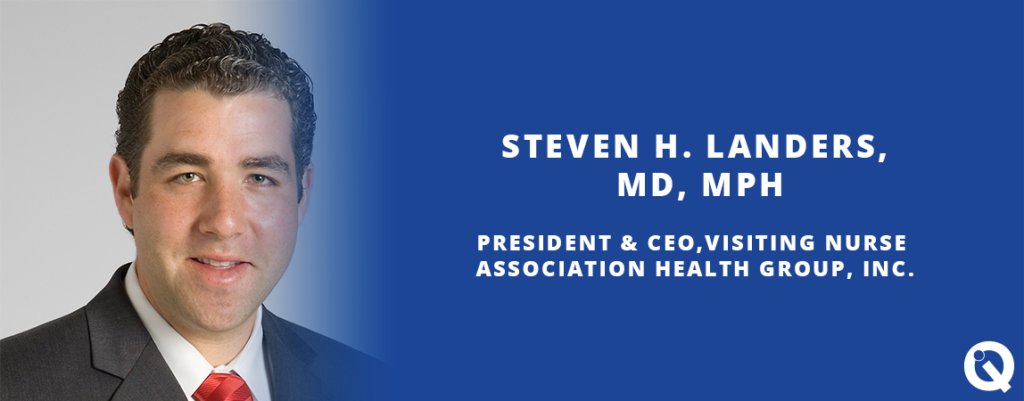Steven H. Landers, M.D., MPH, is President & CEO of the Visiting Nurse Association Health Group, Inc., one of the nation’s largest not-for-profit home health care providers. The organization, headquartered in New Jersey, is a long-time member of the Quality Institute.
How has the COVID-19 crisis changed the way you provide home health services in New Jersey?
The biggest impact is making sure that our workforce is safe and healthy, which has meant adding screening tools and daily check-ins to make sure that there aren’t people is working with symptoms. Since the middle of March, we’ve been able to provide testing and health counseling for our employees. The volume of work we are doing in any given week, to put this into perspective – we’ve been using over 21,000 masks: 17,000 surgical masks and 4,000 N95 masks. Gowns, face protection, gloves, hand sanitizer…getting all those things in place has been a challenge. However, we’ve been able to keep our teams stocked with what they need.
We’ve been able to play an important role by helping people with COVID-19, and those without, come home from hospitals and nursing facilities. Today, we have helped nearly 980 people with COVID-19 get home health and hospice care.
How have you prepared your workforce to safely treat patients in their homes?
In addition to what I just outlined, we also developed a telehealth model to pair with the home visiting nurse model. Lots of visits have transitioned to telephone check-ins. We have tried to zero in on only essential home visits in order to protect our staff and our patients.
Are more people now looking to access home care as a result of COVID-19?
Overall, we are getting fewer home health patients than we were a few months ago because helping people recover from elective surgery, such as knee replacement and other joint surgeries, is a big part of home care. Due the pandemic and the need to ensure hospital capacity for COVID-19 patients, those surgeries were canceled up until recently, which caused a 35% to 40% decrease in our home health admissions. Due those changes, we’ve been focusing on caring for patients needing care at home for COVID-19 so they can leave the hospital or emergency room – that’s the new type of home health requests we are getting and we have made sure we were able to step up to do it.
What more can be done to strengthen our public health so that we are better prepared for future health crises?
When you stress the health care system like this — people have emergency childcare issues, some people are sick, and some people have chronic conditions — we’re just not prepared enough in terms of the frontline nursing workforce. I’m a big advocate for expanding training of nurses and other front-line caregivers. We can also do more on coordination across different agencies on a range of issues from personal protective equipment to testing because it’s clear all the fragmentation has slowed down our ability to respond.
Your organization is a strong partner of our Conversation of Your Life (COYL) program. How has COVID-19 changed the conversation around advance-care planning?
I hope that it’s been a wake-up call for families to plan ahead. It is hard to make decisions and get the outcome you want in a crisis. My hope is that somebody could use this time while isolating at home to tell their family or friends what they want when it comes to end of life care. They can take a video, for instance, and talk about their health and preferences at the end of life.

